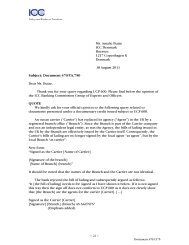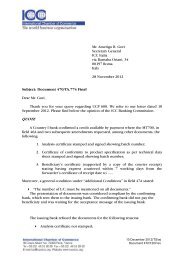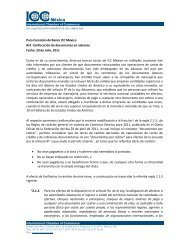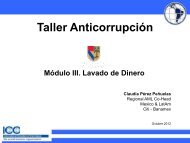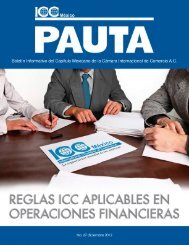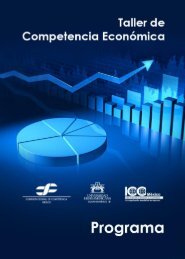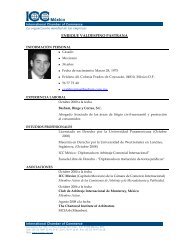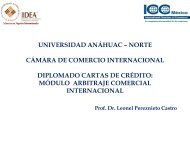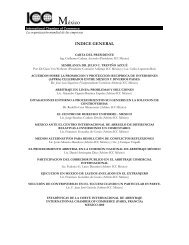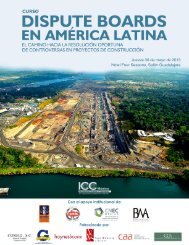Pauta 54.pdf - ICC México
Pauta 54.pdf - ICC México
Pauta 54.pdf - ICC México
- No tags were found...
You also want an ePaper? Increase the reach of your titles
YUMPU automatically turns print PDFs into web optimized ePapers that Google loves.
Final Report on ConstructionIndustry Arbittrationsset out its own list of issues before drafting the terms of reference. However a list that is very long would not servea useful purpose, in which case a working summary should be set out in the terms of reference but refined at theprocedural or organisational meeting which must follow. That list should be revised and reissued by the tribunalas the case proceeds in consultation with the parties, e.g. at any further procedural meeting. [Paras 26-27, 33]10. Unless the parties have already agreed on specific procedural rules no attempt should be made to do more thandescribe the rules in the usual general terms, and to leave them to be worked out at the procedural meeting.[Paras 28 and 32]Hearing Date and Timetable11. The tribunal should inform the parties of the likely hearing date (assuming a single hearing or the first of a seriesof hearings) at the time when the draft Terms of Reference are circulated so as to facilitate agreement on thedate. [Para 30]12. If a date cannot be agreed and has to be decided by the tribunal then it should be the earliest date practicablefor the parties. Although in most typical construction arbitrations it may well be difficult or impossible to devise atimetable that will meet the six months contemplated by Article 24.1 of the <strong>ICC</strong> Rules, that period should not beignored, especially where the dispute has already been processed by contractual dispute resolution machineryand has been the subject of settlement discussions when the points at issue may have been refined and which willnow only be resolved by an award (unless the dispute is of above-average complexity or requires more than oneaward). In arriving at a date (and also the procedure), the tribunal must of course take into account the financialposition of each party (or those supporting a party) so far as it is known or to be inferred and the resources likelyto be available to it. [Paras 30-31]13. In arriving at any date for a hearing or any part of the provisional timetable the tribunal should ensure that theparties have opportunities to take stock and to negotiate and some latitude must be allowed in case there isslippage. [Paras 31, 46, 47]14. Time must also be set aside for the tribunal to be able to read all relevant material before the hearing (or anysubsequent procedural meeting). [Para 48]Splitting the Case15. Decisions about splitting a case into parts should be left until it is clear that it will be sensible and cost-effective todo so. [Para 49]16. Before a decision is made about splitting a case, the claimant's case on both causation and quantification shouldbe known so that it is clear how the costs and losses are said to have arisen. The tribunal should be sure that adecision favourable to the claimant on liability and causation will have significant financial consequences. If it isnot sure then the tribunal should not split a case, as one of the key reasons for a split is that a partial award islikely to lead to agreement on the remaining issues. Equally a tribunal must be satisfied that, if a decision weretaken to examine the apparent basis in fact or law of a claim and if that basis were rejected, the claimant wouldnot be able to present an alternative fall-back case. [Paras 49, 50]Procedure after the Terms of Reference17. The meeting at which the Terms of Reference are drawn up and signed should not be combined with the firstprocedural meeting since discussions about procedure and in particular the timetable can impede the settlementof the Terms of Reference, although the first procedural meeting should take place on the same occasion andshould follow on immediately afterwards. [Paras 28-29]PAUTA 57



